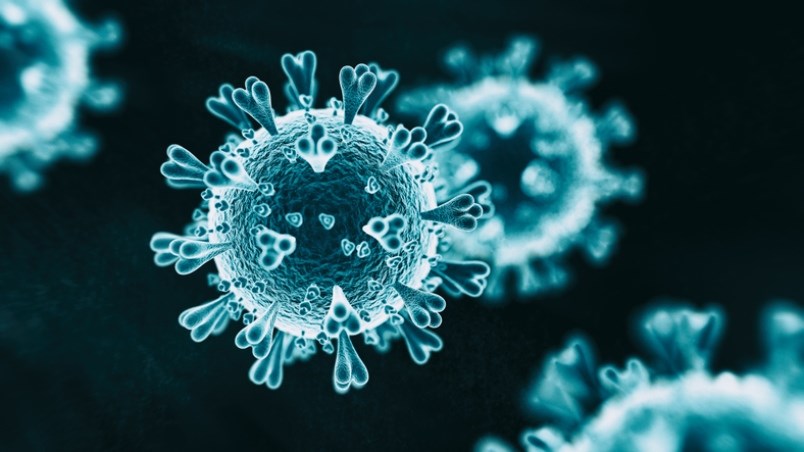COVID-19 cases remain in a holding pattern on the North Shore, according to recent data.
New COVID-19 infections aren’t increasing, but they also aren’t dropping off, according to information from B.C.’s Centre for Disease Control.
The situation has remained relatively unchanged in recent weeks, despite the easing of previous COVID restrictions, and the more transmissible BA.2 variant of Omicron making up the majority of infections in B.C., including in Vancouver Coastal Health.
There were 70 new cases of COVID on the North Shore, as measured by official PCR testing, for the week of May 1-7, according to B.C.'s Centre for Disease Control, the same number of cases reported the week before. That included 61 new cases in North Vancouver and 9 cases in West Vancouver, numbers virtually unchanged in the past two weeks.
Although PCR testing is done for only a small number of people, who are likely to be at particular risk of serious illness from the virus, it is considered an indicator of more general trends.
At a May 10 press conference, Dr. Bonnie Henry, the province’s health officer, said, “Our weekly surveillance reports gives you the sense of what I call our COVID climate ... trends that we're seeing right now over time.
“We are transitioning through this emergency phase of the pandemic. But we still need to be vigilant. And we still need to be aware of the things that make a difference both for us personally and for those around us. We're not through it yet.”
Official case rates are sitting at three daily cases per 100,000 people in both North Vancouver municipalities, and two per 100,000 in West Vancouver.
The BA.2 variant of Omicron now makes up almost all cases of the virus in the province, according to the B.C. Centre for Disease Control.
Hospitalizations up slightly in VCH
In Vancouver Coastal Health – which also includes hospitals in Vancouver, Richmond, the Sunshine Coast and Sea-to-Sky Corridor – hospitalizations were up this week, but only slightly. There were 135 people in hospital with COVID as of May 12, up slightly from 128 the week before. Nine of those people were in critical care.
Wastewater concentrations up
The most recent reporting of wastewater data showing COVID-19 concentrations at the Lions Gate sewage treatment plant shows slightly increased levels of the virus.
The most recent samples included concentrations of 76,599 viral parts per litre on May 9 and 65,821 viral parts per litre on May 7. That’s up from 57,813 viral parts per litre on April 27 and 17,891 viral parts per litre on April 25.
Measurements in recent months have often hovered between 29,000 and 69,000 parts per litre.
Although wastewater concentrations don't measure the number of people infected with COVID-19 directly, they are considered one of the more accurate barometers of overall infection levels in communities, as they pick up viral signals from people who have tested positive on rapid tests at home but who are not part of official case counts.
At the peak of the Omicron wave at the beginning of the year, viral concentrations measured 333,000 parts per litre at the Lions Gate sewage treatment plant.
Vax rates stalled
Vaccination rates among both adults and children on the North Shore haven’t budged much for months.
Between 92 and 96 per cent of adults on the North Shore have had two doses of vaccine, and between 67 and 71 per cent have received a booster shot – higher than the provincial average.
Between 55 and 66 per cent of children five to 11 on the North Shore have also received two doses of COVID vaccine.
The ICBC site vaccine clinic remains open for children aged five to 11, while adults are now being directed to local pharmacies for their shots.
In April, seniors in long-term care and those deemed clinically vulnerable were offered a fourth dose of vaccine. This month, many people over 70 will also be eligible for a fourth shot.
Officials look ahead to possible surge in fall
Asked what she expected to happen with COVID cases in the coming months in B.C., Henry said Tuesday, “We will likely have some reprieve in the next few months. But we need to plan for what’s coming.”
In particular, Henry said health officials need to plan for possible surge of cases in the fall.
"This virus is going to be with us for some time. We do not yet know if all of us will need another dose of vaccine come the fall or protection from the three doses will carry most of us through and only some people will need another dose. Those are the things that we are planning for the future,” she said.
Henry said looking at data from around the world, “It’s shocking to think but there's close to a million people now who have died in the United States, at least recorded, and probably more. And if we look around Canada, we have not had that level of devastation and tragedy. But we've had enough. So we do need to be cautious as we go through this. And we need to be prepared that we're going to see a surge in the fall.”





